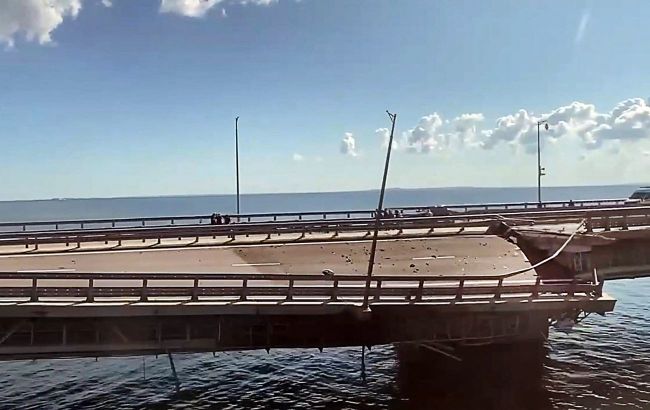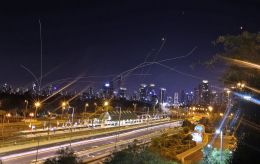Crimean Bridge blast: key details of new explosions and their impact on Russian logistics
 Experts believe that the explosions on the Crimean Bridge did not affect Russian logistics (Photo: Getty Images)
Experts believe that the explosions on the Crimean Bridge did not affect Russian logistics (Photo: Getty Images)
Powerful explosions rocked the Crimean Bridge, which connects Russia with the temporarily occupied peninsula, last night. By morning, the aftermath of this resulted in significant damage, not to the railway but to the road connection.
RBC-Ukraine has compiled what is known about the consequences of the destruction of the Crimean Bridge and how it may affect Russian logistics.
New explosions on the Crimean Bridge: how it unfolded
After an almost 10-month hiatus since the significant damage suffered by the bridge in October 2022, Ukraine woke up today with news that new explosions happened on the Crimean Bridge.
This time, as witnesses report, powerful explosions occurred on the bridge at approximately 3:04 and 3:20. Following the explosions, the local occupying authorities halted traffic on the bridge. It was closed to cars, trains, and even the ferry service was suspended.
The so-called "head" of Crimea, Sergei Aksyonov, later commented on the situation, claiming that there was an alleged "emergency situation in the vicinity of support No. 145."
The governor stated that "measures are being taken to restore the situation." At the same time, he urged people to refrain from using the bridge, and the so-called Ministry of Resorts of Crimea asked "tourists" to travel by "overland routes" (referring to the route through the temporarily occupied territories of Ukraine) or preferably stay in hotels.
Initially, Russian Telegram channels reported that at least one of the spans of the bridge collapsed due to the explosions. However, it was later revealed that the damage was more substantial. One span in one direction fell into the water, while another noticeably shifted to the side, making it impossible for cars to pass over the bridge.
As a result, a multi-kilometer traffic jam formed before entering the Crimean Bridge. "Law enforcement officers" redirected drivers of trucks and cars and urged them to use "alternative overland routes through the 'new territories.'"
This incident did not come without casualties. As a result of the explosions on the bridge, a couple from the Belgorod region of Russia, who were traveling to the occupied peninsula for vacation, lost their lives. Their 14-year-old daughter was hospitalized.
Who is behind the explosions?
Traditionally, the Russian authorities have begun blaming Ukraine for everything. Press Secretary of the Russian dictator Dmitry Peskov said that "the Russian government knows who is behind the explosion of the Crimean Bridge."
"We know the reasons and those who are responsible for this terrorist act. It will require further gathering and additional measures and work from all of us. No other measures were discussed at the moment... If we consider the ultimate perspective, the response will be achieving our own goals," he said.
Criminal proceedings have also been initiated in Russia under the article on "terrorism." Additionally, the Russians immediately began putting forward their versions of what happened. One of them suggested that Ukraine allegedly modified scooters into underwater drones with explosives.
Russian propaganda released a video allegedly showing the destruction of such an object in Sevastopol on June 16 and indicated that a similar attack could have targeted the Crimean Bridge overnight.
The Ukrainian side did not officially claim responsibility for the explosions. However, sources of RBC-Ukraine in the Security Service of Ukraine (SBU) reported that the SBU and the Ukrainian Naval Forces were involved in the explosions. They supposedly carried out the attack on the bridge using underwater drones.
"The bridge was attacked using underwater drones. It was difficult to reach the bridge, but eventually, it was done," the source reported.
They also explained that earlier, the head of the SBU, Vasyl Maliuk, had stated that the bridge is a legitimate target for Ukraine and promised to reveal the details of unique special operations after victory.
The official reaction from the SBU was interesting. The department's press service humorously commented on the incident in the form of a poem:
"Soloveyko (Nightingale), dear brother, the bridge went 'to sleep' again. Ta-da... Ta-da! P.S. Music - folk. Lyrics - SBU."
In a comment to RBC-Ukraine, SBU spokesperson Artem Dekhtiarenko also refrained from providing details about the incident on the Crimean Bridge but promised that all the details regarding the organization of the operation would be revealed after their victory.
"Meanwhile, we are watching with interest as one of the symbols of the Putin regime once again fails under military pressure," Dekhtiarenko said.
The responses from the Main Intelligence Directorate (GUR) and the Office of the President were brief. In particular, the spokesperson for the Main Intelligence Directorate of the Ministry of Defense, Andriy Yusov, stated that the GUR does not comment on the reasons for the events on the Crimean Bridge.
"We can only quote the words of the head of the GUR, Kyrylo Budanov, that the Crimean Bridge is an unnecessary construction," Yusov noted.
In turn, Mykhailo Podolyak, an advisor to the Head of the Office of the President, explained that any illegal structures used to deliver Russian weapons of mass killings are short-lived. Regardless of the reasons for their destruction.
Did the new explosions disrupt Russian logistics?
Military-political expert of the "Information Resistance" group, Oleksandr Kovalenko, drew attention to the fact that the damage caused by the night explosions affected the road transport connection. Therefore, the railway used by Russian occupying forces to supply their troops continues to operate.
"The damage to the road surface is quite serious. It requires appropriate repairs. Undoubtedly, in this direction, this road will be closed and will not function for some time. It is another question of how long it will take them to repair it," Kovalenko said.
At the same time, the expert points out that there will be no full-fledged road transport connection between mainland Russia and temporarily occupied Crimea for some time.
"But the logistic artery that remains will work in reverse. Of course, the overall flow of automobile transportation will decrease and become slower. But there is a nuance here. We are talking specifically about road transport, which Russian forces do not use very often for transporting personnel, etc., to occupied Crimea. It is not the predominant component. Mostly, it is railway routes. And the railway is currently working in a limited capacity on the Crimean Bridge, in reverse format," Kovalenko emphasized.
The interlocutor explained that this damage is crucial for the overall logistic artery. However, there is still the railway. Therefore, more "cotton" is needed to solve this issue.
"Indeed, there is a decrease in military logistics by about 10-15%, but the railway can compensate for it. As for the specific damage to the bridge, the laws of physics are the same for everyone. Therefore, I do not exclude that it could be an explosion that occurred under the road surface itself, not an external impact," Kovalenko added.
Military expert Vladyslav Seleznov shares a similar opinion. He believes that this "cotton" on the Crimean Bridge will not affect the logistics of the occupiers because the railway connection continues to operate.
"The supply of the lion's share of the enemy's military logistics is provided by railways. So, I have no illusions about it. There may only be a problem with civilian transport. We can see that the Russians have resolved this issue by launching freight trucks through the so-called 'new territories' (occupied ones). Accordingly, ferry connections will be used for passenger cars," Seleznov said in a comment to the publication.
The expert believes that, for the time being, military echelons will continue to run on the railway connection together with passenger trains from Crimea to mainland Russia.
"Therefore, I don't think that this damage to the Crimean Bridge in this road transport part will fundamentally change the situation from the military point of view," Seleznov noted.
Regarding involvement in the sabotage, the Southern Design Bureau, says that it could be a casus belli from the Russian occupation forces. In particular, Natalia Humeniuk, spokesperson for the Security and Defense Forces of the South of Ukraine, believes that this attack could be a Russian provocation before the continuation of the "grain deal." Therefore, the expert urges not to rush to conclusions amid the information noise.
"I think it's worth waiting and not wasting time looking for culprits. If this process is secretive, we are unlikely to learn about it in the near future. There can be various versions, but whether they correspond to reality is unknown," Seleznov concluded.

